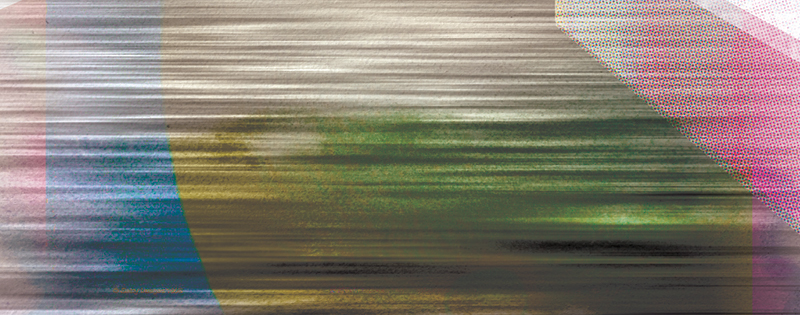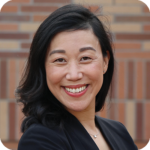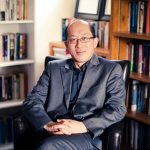
AMOS YONG: Janette, after five years teaching at Azusa Pacific University, you arrived at Fuller (welcome!) only to join a seminary in transition. You did not have to move your home residence, but how has the sense of being “in-between” felt during this time?
JANETTE OK: When I joined Fuller’s faculty, I anticipated a transition within transition. I wanted to come in with a firm grasp and appreciation of Fuller’s history, but at the same time be attentive to where Fuller is now and what Fuller is becoming. My in-between experience has felt like a full-immersion baptism—no sprinkling or toe dipping! I’m adapting to change while in motion and learning as I go. I think the hardest part has been holding in tension my desire to listen and not presume while being fully present and actively engaged in informed decision-making. I feel honored and excited to be a part of what God is doing at Fuller.
AY: Fuller is undergoing one of the deepest changes in its history, responding to the onset of the coronavirus on the one hand, with all of the economic, racial, environmental, and political crises of 2020 in its wake, and to the disruptions of higher education and specifically theological education on the other hand. What practices—personal, familial, ecclesial, or otherwise—have kept you grounded amidst these dynamics?
JO: I have been more intentional about anchoring myself in certain practices and rhythms that help me connect meaningfully with others, myself, and God. I spend time each day reading Scripture on my own. But one of the highlights of the school year has been participating in Fuller’s weekly Communal Reading of Scripture. Mondays tend to be one of the busiest days of the week, when I put my nose to the grindstone. So this practice of listening to Scripture with others, without any agenda other than being present, attentive, and open to hearing God’s Word, helps position me in a posture of expectation and wonder. Corporate worship and prayer have been my touchstones, as I try to participate in Fuller’s weekly chapel services, which are amazing, and in weekly prayer meetings with my church. My family and I worship with our church family every Sunday at the same time and place in our living room, knowing that even when we do so remotely, we are gathering and being built up as the body of Christ. For the past eight years, I have met monthly with a group of women in ministry for lectio divina and prayer. I also meet every month with my spiritual director, who helps me embrace stillness and trust in the slow work of God.
Because I work from home, the hours of the day tend to blur into each other, making clear delineations between rest and work harder to maintain. It’s been exhausting and overwhelming much of the time. But something I treasure about this long, seemingly unremitting season is the amount of “quantity time” I have been able to spend with my family. My husband, Ricky, and I are grateful that our three kids are still young enough to enjoy being stuck at home with us. As a family, we are much less hurried and are learning the joys of just being together without doing so much. To unwind, I cook, read, listen to audiobooks, and take long walks with our dog, who I think is benefiting most from this pandemic.
AY: This may be the new “normal” indeed: even after vaccinations are more widely available, the workplace of the 2020s will continue to be distributed, which will surely also be true for Fuller, where our three campuses in Pasadena, Houston, and Phoenix are already hubs for an internationally dispersed student body and a global alumni network. What is striking about your own journey through this period of what we might call pandemic liminality is both that the fundamental spiritual practices remain—prayer, reading (in this case: hearing) Scripture, worship, and fellowship—but beyond that, your family includes your dog, a reminder that our lives are integrally intertwined with non-human species. In a time of Zoom fatigue that shows no signs of going away in the next few years, we must build in those Sabbath commitments. Do you have practical tips for how to build in such moments of rest?
JO: For me, rest is an act of trust and courage. Sabbath commitments, as you put it, remind me that I’m not as important as I think I am and that my work, as rewarding as it is, is not an end in itself. Allowing myself to be unproductive helps me enjoy peace and release in God. Our kids are particularly proficient at disrupting my productivity and reminding me of the pleasures and importance of play. In this period of pandemic liminality, I am trying to be more playful and whimsical, whether it be tossing around a ball with the kids or getting on the floor to play with Legos or breaking out in spontaneous dance or song in the middle of cooking dinner.
Even when I am resting physically from working, my mind struggles to enter the headspace of being at ease in God’s love, presence, and joy. One way I rewire my brain for rest and delight is by listening to music (while on those long walks with the dog) and reading for pleasure, not for teaching or research. I try to eat meals on weekends slowly and not scarf down food as I am prone to do when I take lunch breaks during the week. And I love a good meal, so I try to treat myself now and then to something delicious that I didn’t have to cook!
Back in Princeton, where my husband and I lived for eight years, my favorite coffee shop had the slogan, “sleep is for the weak.” This slogan jived with me especially when I was a doctoral student with an infant. If I slept when my body wanted me to, I’d flunk out of coursework! I would do push-ups to pump myself up when my eyes began drooping. Instead of taking naps on my bed, which would relax my body and remind it of just how tired it really was, I’d take 10-minute power naps on the hard floor. It sounds nuts, but it was a survival tactic that I’m trying to wean myself from now that my kids are older. Simply put, I need more sleep!
Now, rather than think of weakness as a thing to work around, I embrace it. Sleep is for the weak. Rest is God’s gift to us, his beloved, created, and dependent children. We’re made in God’s image, but we’re not God. God is steadfast, faithful, and makes the world go round. It is by accepting and embracing this truth about us and about our God that we begin to see work in relationship to rest and in light of God’s provision.
AY: Yes, sometimes our Christian piety pushes us toward a worldly perfectionism when what God works with is our imperfections! May many readers find in your words some helpful suggestions for experiencing God’s strengthening presence for the difficult journeys we all are on.

Janette Ok serves as associate professor of New Testament at Fuller. Dr. Ok received her MDiv and PhD from Princeton Theological Seminary. She is the author of the forthcoming book Constructing Ethnic Identity in 1 Peter: Who You Are No Longer and is a coeditor of The New Testament in Color: A Multiethnic Commentary on the New Testament.

Amos Yong is chief academic officer, dean of the Schools of Theology and Intercultural Studies, and professor of theology and mission at Fuller Seminary. He has authored or edited almost four dozen books, including The Missiological Spirit: Christian Mission Theology in the Third Millennium Global Context and The Future of Evangelical Theology: Soundings from the Asian American Diaspora.
AMOS YONG: Janette, after five years teaching at Azusa Pacific University, you arrived at Fuller (welcome!) only to join a seminary in transition. You did not have to move your home residence, but how has the sense of being “in-between” felt during this time?
JANETTE OK: When I joined Fuller’s faculty, I anticipated a transition within transition. I wanted to come in with a firm grasp and appreciation of Fuller’s history, but at the same time be attentive to where Fuller is now and what Fuller is becoming. My in-between experience has felt like a full-immersion baptism—no sprinkling or toe dipping! I’m adapting to change while in motion and learning as I go. I think the hardest part has been holding in tension my desire to listen and not presume while being fully present and actively engaged in informed decision-making. I feel honored and excited to be a part of what God is doing at Fuller.
AY: Fuller is undergoing one of the deepest changes in its history, responding to the onset of the coronavirus on the one hand, with all of the economic, racial, environmental, and political crises of 2020 in its wake, and to the disruptions of higher education and specifically theological education on the other hand. What practices—personal, familial, ecclesial, or otherwise—have kept you grounded amidst these dynamics?
JO: I have been more intentional about anchoring myself in certain practices and rhythms that help me connect meaningfully with others, myself, and God. I spend time each day reading Scripture on my own. But one of the highlights of the school year has been participating in Fuller’s weekly Communal Reading of Scripture. Mondays tend to be one of the busiest days of the week, when I put my nose to the grindstone. So this practice of listening to Scripture with others, without any agenda other than being present, attentive, and open to hearing God’s Word, helps position me in a posture of expectation and wonder. Corporate worship and prayer have been my touchstones, as I try to participate in Fuller’s weekly chapel services, which are amazing, and in weekly prayer meetings with my church. My family and I worship with our church family every Sunday at the same time and place in our living room, knowing that even when we do so remotely, we are gathering and being built up as the body of Christ. For the past eight years, I have met monthly with a group of women in ministry for lectio divina and prayer. I also meet every month with my spiritual director, who helps me embrace stillness and trust in the slow work of God.
Because I work from home, the hours of the day tend to blur into each other, making clear delineations between rest and work harder to maintain. It’s been exhausting and overwhelming much of the time. But something I treasure about this long, seemingly unremitting season is the amount of “quantity time” I have been able to spend with my family. My husband, Ricky, and I are grateful that our three kids are still young enough to enjoy being stuck at home with us. As a family, we are much less hurried and are learning the joys of just being together without doing so much. To unwind, I cook, read, listen to audiobooks, and take long walks with our dog, who I think is benefiting most from this pandemic.
AY: This may be the new “normal” indeed: even after vaccinations are more widely available, the workplace of the 2020s will continue to be distributed, which will surely also be true for Fuller, where our three campuses in Pasadena, Houston, and Phoenix are already hubs for an internationally dispersed student body and a global alumni network. What is striking about your own journey through this period of what we might call pandemic liminality is both that the fundamental spiritual practices remain—prayer, reading (in this case: hearing) Scripture, worship, and fellowship—but beyond that, your family includes your dog, a reminder that our lives are integrally intertwined with non-human species. In a time of Zoom fatigue that shows no signs of going away in the next few years, we must build in those Sabbath commitments. Do you have practical tips for how to build in such moments of rest?
JO: For me, rest is an act of trust and courage. Sabbath commitments, as you put it, remind me that I’m not as important as I think I am and that my work, as rewarding as it is, is not an end in itself. Allowing myself to be unproductive helps me enjoy peace and release in God. Our kids are particularly proficient at disrupting my productivity and reminding me of the pleasures and importance of play. In this period of pandemic liminality, I am trying to be more playful and whimsical, whether it be tossing around a ball with the kids or getting on the floor to play with Legos or breaking out in spontaneous dance or song in the middle of cooking dinner.
Even when I am resting physically from working, my mind struggles to enter the headspace of being at ease in God’s love, presence, and joy. One way I rewire my brain for rest and delight is by listening to music (while on those long walks with the dog) and reading for pleasure, not for teaching or research. I try to eat meals on weekends slowly and not scarf down food as I am prone to do when I take lunch breaks during the week. And I love a good meal, so I try to treat myself now and then to something delicious that I didn’t have to cook!
Back in Princeton, where my husband and I lived for eight years, my favorite coffee shop had the slogan, “sleep is for the weak.” This slogan jived with me especially when I was a doctoral student with an infant. If I slept when my body wanted me to, I’d flunk out of coursework! I would do push-ups to pump myself up when my eyes began drooping. Instead of taking naps on my bed, which would relax my body and remind it of just how tired it really was, I’d take 10-minute power naps on the hard floor. It sounds nuts, but it was a survival tactic that I’m trying to wean myself from now that my kids are older. Simply put, I need more sleep!
Now, rather than think of weakness as a thing to work around, I embrace it. Sleep is for the weak. Rest is God’s gift to us, his beloved, created, and dependent children. We’re made in God’s image, but we’re not God. God is steadfast, faithful, and makes the world go round. It is by accepting and embracing this truth about us and about our God that we begin to see work in relationship to rest and in light of God’s provision.
AY: Yes, sometimes our Christian piety pushes us toward a worldly perfectionism when what God works with is our imperfections! May many readers find in your words some helpful suggestions for experiencing God’s strengthening presence for the difficult journeys we all are on.
Janette Ok serves as associate professor of New Testament at Fuller. Dr. Ok received her MDiv and PhD from Princeton Theological Seminary. She is the author of the forthcoming book Constructing Ethnic Identity in 1 Peter: Who You Are No Longer and is a coeditor of The New Testament in Color: A Multiethnic Commentary on the New Testament.
Amos Yong is chief academic officer, dean of the Schools of Theology and Intercultural Studies, and professor of theology and mission at Fuller Seminary. He has authored or edited almost four dozen books, including The Missiological Spirit: Christian Mission Theology in the Third Millennium Global Context and The Future of Evangelical Theology: Soundings from the Asian American Diaspora.
Brie Turns, assistant professor of marriage and family therapy, writes about four areas of self-care for those walking with others through suffering and loss.